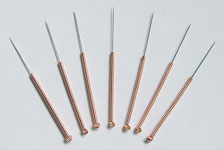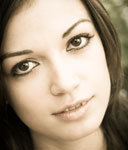What is Acupuncture Healing
Acupuncture is a branch of ancient chinese medicine that uses extremely small needles inserted under the skin to help restore the balance of Yin and Yang in the body. The needles regulating the flow of energy, often called chi (or qi) , along the “rivers”of energy through the body known as meridians.Though we don’t know the origins of acupuncture, we do know that artifacts from as early as the Shang Dynasty (1600 – 1050 BC) have been found that show evidence of the use of some form of acupuncture – even before the advancements of modern metallurgy enabled the use of such small needles. More depth about acupuncture history can be found at wikipedia.
Acupuncture Video
[dailymotion http://www.dailymotion.com/embed/video/x5nbqy]
(Acupuncture Video: this is a bit longer than I wanted, but it was too excellent to pass up)
Acupuncture Frequently Asked Questions (FAQ)
Q – Will acupuncture hurt me?
A – Most people find it to be painless, although some people report a slight sharp sensation depending on where on there body the needles are inserted and how sensitive they are. After the needle is in place, it’s normal to feel a tingling, warmth, numbness or mild pressure. This is actually an indicator of good placement. If it becomes too strong or overpowering, let your practitioner know so he/she can make adjustments to the needles.
Q – Will I have to get naked?
A – Most of the acupuncture points on the body are below the knees and elbows or in the ears, so usually just wearing loose clothes allows the acupuncturist to reach the necessary points. In the few instances where the points are outside those places mentioned, most acupuncturists will supply you with a gown or some other modest covering allowing you to be treated without baring yourself.
Q – How much does it usually cost per session?
A – This is a tough question to answer with any accuracy since therapists base their rates on many factors from experience and reputation to the demand for services in their area. Most often the prices range from $40 – $120 per treatment in the US and Canada. (or if you prefer to take a vacation to China, even some of the best practitioners over there are about $10 per treatment)
This is a perfect question to ask the acupuncturists in your are before you make an appointment.
Q – Does Acupuncture work?
A – This is an extremely common question (as well as controversial), but it’s about like saying “does surgery work”…for what? Many people claim an extremely wide spectrum of things that acupuncture treats, but there are also the others who protest that it has never been proven conclusively by modern science. The only definitive answer you will be able to find to this question will be by your own experience. – some replies to this question can be seen in the video above.
Q – Do I have to believe in acupuncture for it to work?
A – It doesn’t make any difference what your personal feelings area about acupuncture any more than you do about many aspects of western medicine. As a matter of fact many people report success with acupuncture on dogs, cat, horses, and other animals…and they don’t believe.
Opinions about Acupuncture
The acceptance of acupuncture in modern society is one major place where we see a shift in perspectives away from the final authority of western or european medicine. Along with growing acceptance, there is also a growing spectrum of opinions around acupuncture. From “scientific” theories about stimulating the nervous system and promoting blood flow, to scientists who use blind studies to “prove” the level of effectiveness (or ineffectiveness), there has been considerable interest from the scientific community as well.
Styles of Acupuncture
We often talk of acupuncture as though it is systematic without reference to the fact that there are many styles of treatment which include but are not limited to traditional Chinese medicine acupuncture, Korean hand acupuncture, Japanese acupuncture, auricular acupuncture (focusing on the ear), trigger point acupuncture, and electro-acupuncture. Some modern acupuncturists specialize in one of these styles, but many use numerous practitioners use many styles simultaneously.
Acupuncture Diagnostic Assesment
Regardless of the styles used, a patient can expect a thorough assessment process that seeks to find patterns to indicate optimum treatment. Traditionally there are four types of assesment:
- inspection focuses on the tongue, but may include other parts of the face. The acupuncturist is looking for indications from the size, shape, color, tension, and marks on the tongue that give clues to patterns of illness.
- channel and pulse palpation involves tapping or feeling points of the body to assess sensitivity, color, swelling, temperature, and perspiration as well as evaluation characteristics of numerous deep and superficial pulses to reveal clues of how the organs of the body are operating.
- auscultation and olfaction involve evaluating the sounds and scents produced by the body – as in breath and breathing, the voice, and the cough.
- inquiry involves getting answers to the functioning of your body – often in these seven areas: eating habits, fevers or hot flashes, menstrual cycles, sleep patterns, amount of perspiration, bowel movements, and pain.
Conclusion
Since acupuncture is characteristically individualized and personal (and often involves a bit of intuition on the part of the acupuncturist) your experience with acupuncture is likely to involve a selection of the practices included in this article. It is good practice once you are informed of the basics to “interview” a practitioner in advance of any appointments to find out any specific instructions that acupuncturist has for you to prepare for an appointment and to see if you are comfortable hiring that practitioner for your treatment.
What do you think about acupuncture?
Leave your comments below!

Speak Your Mind
You must be logged in to post a comment.